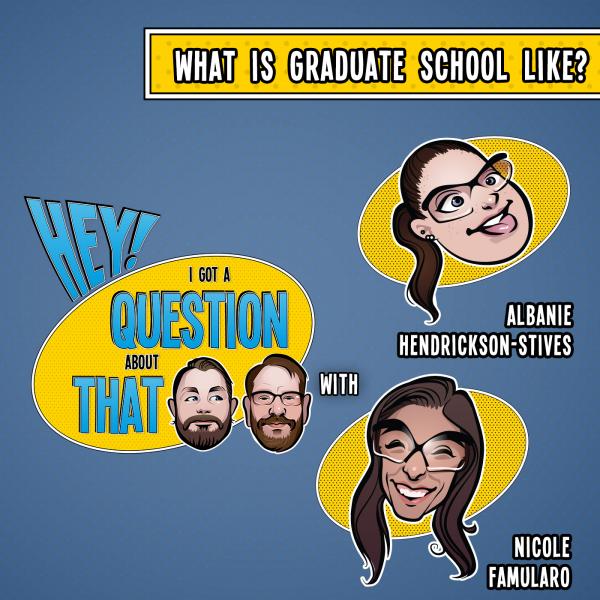Hey! I Got a Question About That
ALIEN LIFE: In this inaugural episode, Nate and Sam travel to Penn State’s observatory on the roof of Davey Laboratory to talk to Jason Wright, associate professor of astronomy and astrophysics, about the possibility of life out there in the universe. Does it exist and what are the methods that researchers are using to look for it?

STRUCTURAL COLOR: Nate and Sam visit Lauren Zarzar, assistant professor of chemistry at Penn State, to talk about color and a cool kitchen science experiment. Where does color come from and what makes things like opals and butterfly wings iridescent?

NITTANY LION GENOME: Nate and Sam are in their new studio for this conversation with Shaun Mahony, assistant professor of biochemistry and molecular biology at Penn State, and George “PJ” Perry, Harry J. & Elissa M. Sichi Early Career Professor in Anthropology and associate professor of anthropology and of biology at Penn State, joins via satellite all the way from Germany. Can DNA sequencing tell us if the “Nittany Lion” is an actual separate species of mountain lion?

GENOME VARIATION: Nate and Sam talk to Santhosh Girirajan, associate professor of biochemistry and molecular biology and of anthropology at Penn State, about what variation in the human genome means and how it relates to complex neurodevelopmental disorders like autism. How do genomes differ between individuals? What can these differences tell us about disease risk? What is normal and is bigger better when it comes to genomes?

VACCINES: Too many guests to fit into our tiny studio this month! So, Nate and Sam take a trip to the Millennium Science Complex at Penn State to talk to Scott Lindner, assistant professor of biochemistry and molecular biology; Matt Ferrari, associate professor of biology and of statistics; and Troy Sutton, assistant professor of veterinary and biomedical sciences, about vaccines. What are vaccines? Are they safe and effective? Spoiler alert: YES!

ANIMALS ADAPT: Tracy Langkilde, professor and head of the Department of Biology at Penn State, joins Nate and Sam in the studio to discuss how animals respond to changes in their environment, like invasive species and traffic noise. How do lizards and frogs respond to such abrupt changes? Can they adapt? Is there a cost?

PLANETS: Chris Palma, associate dean for undergraduate students in the Eberly College of Science and teaching professor of astronomy and astrophysics at Penn State, visits the studio to explain to Nate and Sam that nostalgia is not a proper scientific argument and that Pluto is not a planet. So, what is a planet and what defines them? What else is out there in the solar system? Find out on this month’s episode of “Hey! I got a question about that.”

BIG DATA: Francesca Chiaromonte, Dorothy Foehr Huck and J. Lloyd Huck Chair in Statistics for the Life Sciences at Penn State, joins Nate and Sam in the studio to talk about data, BIG data. Massive amounts of data are being collected constantly from genome sequences, to digital health records, and trends on social media. What is making the data so big? What are statisticians doing to manage this influx of information?

EMERGING DISEASES AND BATS: Nita Bharti, Lloyd Huck Early Career Professor and assistant professor of biology at Penn State, drops in to the studio to help Nate and Sam understand how human encroachment into animal habitats is impacting emerging diseases and how satellite data can help us understand this process. Where do emerging diseases come from? What do bats have to do with it, anyway?

MICROBIOME: Emily Davenport, assistant professor of biology at Penn State, visits Nate and Sam in the newly-revamped studio to talk sh*t. Well, sort of. Emily studies the human microbiome, how it evolved, and how it is related to human health. So, what is the microbiome? What kind of organisms make up our microbiome? How come it seems to be in the news so much lately? And, should we take probiotics?

GENETIC TESTING: Cheryl Keller, associate research professor of biochemistry and molecular biology at Penn State, stops by the studio to talk about genetic testing and direct-to-consumer genetics. What can these genetics tests tell us? How are tests for things like Tay-Sachs disease or Sickle-cell disease different from direct-to-consumer genetic tests? How reliable are they?

PANDEMIC: Nate and Same talk to Doug Cavener, the Verne M. Willaman Dean of the Eberly College of Science at Penn State via Zoom about how the COVID-19 pandemic is impacting the college. Can the dean work from home? How did remote learning work for science classes? Did research continue?

GRAD SCHOOL: It’s season two of “Hey, I got a question about that” and Nate and Sam are back and better than ever. In this episode (with an interview filmed prior to the COVID-19 pandemic), Nicole Famularo and Albanie Hendrickson-Stives visit the studio to talk about graduate school and their research in Christine Keating’s lab in the Department of Chemistry. What is graduate school like? Do graduate students have “free time”?
